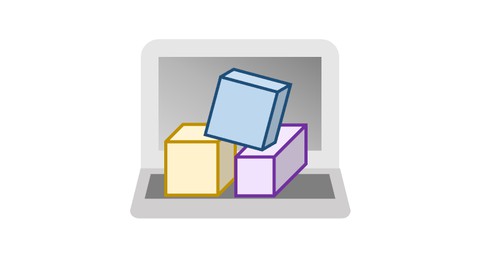
AP Computer Science A: Beginner Java Programming
AP Computer Science A: Beginner Java Programming, available at $64.99, has an average rating of 4.35, with 72 lectures, 11 quizzes, based on 56 reviews, and has 216 subscribers.
You will learn about Build a strong programming foundation Understand the fundamentals of Java programming Apply Java programming concepts Successfully prepare for the AP Computer Science A Exam This course is ideal for individuals who are Students taking the AP Computer Science A course or Anyone interested in learning programming for the first time or Anyone interested in learning the Java programming language It is particularly useful for Students taking the AP Computer Science A course or Anyone interested in learning programming for the first time or Anyone interested in learning the Java programming language.
Enroll now: AP Computer Science A: Beginner Java Programming
Summary
Title: AP Computer Science A: Beginner Java Programming
Price: $64.99
Average Rating: 4.35
Number of Lectures: 72
Number of Quizzes: 11
Number of Published Lectures: 72
Number of Published Quizzes: 9
Number of Curriculum Items: 83
Number of Published Curriculum Objects: 81
Original Price: $19.99
Quality Status: approved
Status: Live
What You Will Learn
- Build a strong programming foundation
- Understand the fundamentals of Java programming
- Apply Java programming concepts
- Successfully prepare for the AP Computer Science A Exam
Who Should Attend
- Students taking the AP Computer Science A course
- Anyone interested in learning programming for the first time
- Anyone interested in learning the Java programming language
Target Audiences
- Students taking the AP Computer Science A course
- Anyone interested in learning programming for the first time
- Anyone interested in learning the Java programming language
Programming can be difficult at first but it doesn’t have to be. Using animations and simple explanations, we make difficult concepts easy. Lift off your Computer Science journey here!
This course teaches you Java programming fundamentals using the AP Computer Science A syllabus. We cover all 10 units of the AP Computer Science A course using practical examples and in-depth explanations.
In this course, you will learn:
-
Key introductory programming concepts such as variables, conditional statements, and loops
-
Object-oriented programming (OOP) concepts including inheritance
-
Data structures such as arrays, 2D arrays, and ArrayLists
-
Complex programming concepts such as recursion
We use animations to provide step by step explanations of how Java programs actually run. By showing what happens when we run a program, students can gain a deeper understanding and appreciation of programming. Each lesson introduces concepts in a concise, easy to understand manner. We recommend taking the course in order as each concept we introduce builds upon the next.
By the end of the course, you will have a strong understanding of Java Programming and have a solid general programming foundation. This will ensure that you are prepared to succeed in the AP Computer Science A course.
If you have any questions or feedback, don’t hesitate to contact us. We are happy to help! Thank you for learning with us!
Course Curriculum
Chapter 1: Unit 1: Primitive Types
Lecture 1: Why Programming? Why Java?
Lecture 2: Compilation and Execution
Lecture 3: Java Programming Tool Setup
Lecture 4: Anatomy of a Java Program
Lecture 5: Print Statements
Lecture 6: Compile-time Errors
Lecture 7: Data Types
Lecture 8: Arithmetic Operators and Expressions
Lecture 9: Arithmetic Expression Type Rules
Lecture 10: Modulo Operator
Lecture 11: Runtime Errors
Lecture 12: Creating Variables
Lecture 13: Accessing Variables
Lecture 14: Modifying Variables
Lecture 15: Variables Exercise
Lecture 16: Naming Variables
Lecture 17: Final Variables
Lecture 18: Compound Assignment Operators
Lecture 19: Type Casting
Lecture 20: Rounding Numbers
Lecture 21: Widening and Narrowing Casting
Chapter 2: Unit 3: Boolean Expressions and if Statements
Lecture 1: What is Boolean?
Lecture 2: Boolean Variables
Lecture 3: Relational Operators
Lecture 4: Relational Operator Precedence
Lecture 5: Using Relational Operators
Lecture 6: Logical Operators
Lecture 7: Truth Tables
Lecture 8: Short-Circuit Evaluation
Lecture 9: Logical Operator Precedence
Lecture 10: Using Logical Operators
Lecture 11: Boolean Variables in Expressions
Lecture 12: De Morgan's Laws
Lecture 13: if Statements
Lecture 14: else Statements
Lecture 15: else if Statements
Lecture 16: Multi-Way Selection
Lecture 17: Variable Scope
Lecture 18: Variable Lifetime
Chapter 3: Unit 4: Iteration
Lecture 1: Introduction to Iteration
Lecture 2: While Loops
Lecture 3: An Iteration of a Loop
Lecture 4: While Loops in Code
Lecture 5: Loop Termination
Lecture 6: For Loops
Lecture 7: Variable Scope and Lifetime in the Loop Header
Lecture 8: Variable Scope and Lifetime in the Loop Body
Lecture 9: For Loops vs While Loops
Chapter 4: Unit 2: Using Objects & Unit 5: Writing Classes
Lecture 1: Classes and Objects
Lecture 2: Instance Variables
Lecture 3: Constructors
Lecture 4: Creating Objects
Lecture 5: Accessing Instance Variables
Lecture 6: Static Variables
Lecture 7: Instance Methods
Lecture 8: Static Methods
Lecture 9: Access Modifiers
Chapter 5: Unit 6: Array
Lecture 1: Arrays
Lecture 2: Creating Arrays
Lecture 3: Traversing Arrays
Chapter 6: Unit 8: 2D Array
Lecture 1: 2D Arrays
Lecture 2: Creating 2D Arrays
Lecture 3: Traversing 2D Arrays
Chapter 7: Unit 7: ArrayList
Lecture 1: Array vs ArrayList
Lecture 2: Creating ArrayLists
Lecture 3: ArrayList Methods
Chapter 8: Unit 9: Inheritance
Lecture 1: Inheritance
Lecture 2: Subclass and Superclass
Lecture 3: Inheriting Fields and Methods
Chapter 9: Unit 10: Recursion
Lecture 1: Recursion
Lecture 2: Declaring Recursive Methods
Lecture 3: Recursive Method Calls
Instructors
-

Lift Off Study
Educator
Rating Distribution
- 1 stars: 2 votes
- 2 stars: 0 votes
- 3 stars: 3 votes
- 4 stars: 24 votes
- 5 stars: 27 votes
Frequently Asked Questions
How long do I have access to the course materials?
You can view and review the lecture materials indefinitely, like an on-demand channel.
Can I take my courses with me wherever I go?
Definitely! If you have an internet connection, courses on Udemy are available on any device at any time. If you don’t have an internet connection, some instructors also let their students download course lectures. That’s up to the instructor though, so make sure you get on their good side!
You may also like
- Digital Marketing Foundation Course
- Google Shopping Ads Digital Marketing Course
- Multi Cloud Infrastructure for beginners
- Master Lead Generation: Grow Subscribers & Sales with Popups
- Complete Copywriting System : write to sell with ease
- Product Positioning Masterclass: Unlock Market Traction
- How to Promote Your Webinar and Get More Attendees?
- Digital Marketing Courses
- Create music with Artificial Intelligence in this new market
- Create CONVERTING UGC Content So Brands Will Pay You More
- Podcast: The top 8 ways to monetize by Podcasting
- TikTok Marketing Mastery: Learn to Grow & Go Viral
- Free Digital Marketing Basics Course in Hindi
- MailChimp Free Mailing Lists: MailChimp Email Marketing
- Automate Digital Marketing & Social Media with Generative AI
- Google Ads MasterClass – All Advanced Features
- Online Course Creator: Create & Sell Online Courses Today!
- Introduction to SEO – Basic Principles of SEO
- Affiliate Marketing For Beginners: Go From Novice To Pro
- Effective Website Planning Made Simple




















